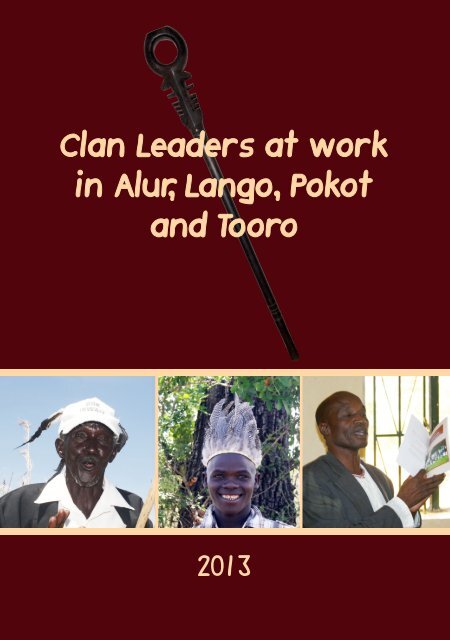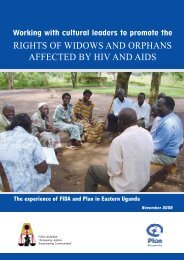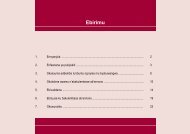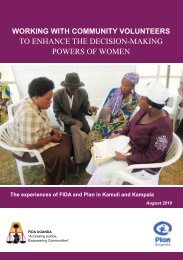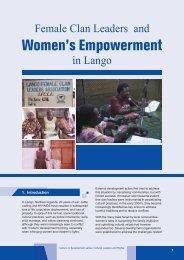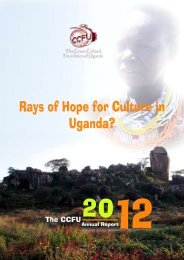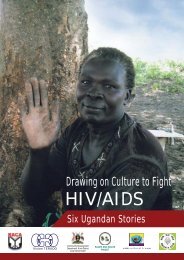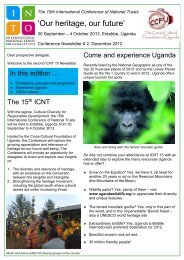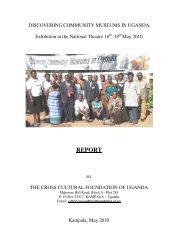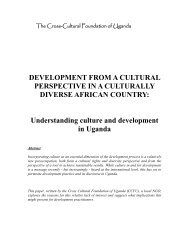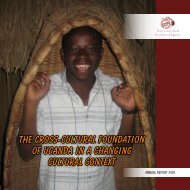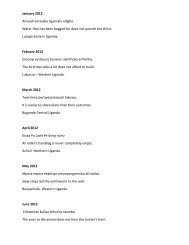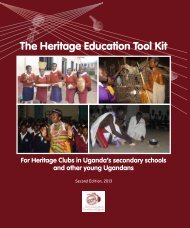Clan Leaders at work, 2013 - Cross-Cultural Foundation of Uganda ...
Clan Leaders at work, 2013 - Cross-Cultural Foundation of Uganda ...
Clan Leaders at work, 2013 - Cross-Cultural Foundation of Uganda ...
- No tags were found...
Create successful ePaper yourself
Turn your PDF publications into a flip-book with our unique Google optimized e-Paper software.
<strong>Clan</strong> <strong>Leaders</strong> <strong>at</strong> <strong>work</strong>in Alur, Lango, Pokotand Tooro<strong>2013</strong>
<strong>Clan</strong> leaders and governanceWe are frequently told th<strong>at</strong> <strong>Uganda</strong> is making much progress – new roads, new health centres,regular elections - the signs are many and diverse. We are also <strong>of</strong>ten reminded th<strong>at</strong> this progressis <strong>at</strong> risk <strong>of</strong> being undermined by (among others) corruption, the yawning gap between therich and the poor, the failure <strong>of</strong> government to provide adequ<strong>at</strong>e services, and unemployment,especially for the youth.These grave risks are frequently ascribed to ‘governance deficits’ or even ‘governance failure’.Much <strong>at</strong>tention is then devoted to strengthening institutions and practices to foster a moredemocr<strong>at</strong>ic and responsive way to govern ourselves. Elections are held, civil society is calledupon to hold leaders to account, parliament sits and passes laws, anti-corruption agencies swinginto action. And yet,little progress seemsto be registered:d i s s a t i s f a c t i o nprevails, ‘goodgovernance’ proveselusive.If we however recallth<strong>at</strong> governance isan evolving processthrough whichpeople organisethemselves tobuild the kind <strong>of</strong>society they aspirefor, we find th<strong>at</strong>our new institutions are <strong>of</strong>ten divorced from our traditions and ancestral values, and th<strong>at</strong> thismakes it difficult to ‘own’ and recognise them as central to our well-being. With distance, comedisaffection, corruption and undemocr<strong>at</strong>ic tendencies.Yet, we have governed ourselves, if not always perfectly, for centuries and clans have beencentral to this. Today, most <strong>Uganda</strong>ns belong to clans but they seem to have become absentfrom our contemporary governance agenda. This is in spite <strong>of</strong> their continued role, in most <strong>of</strong> ourcommunities, as custodians <strong>of</strong> culture and values we <strong>of</strong>ten much treasure, and as responsiblefor security, leadership, conflict medi<strong>at</strong>ion, and enforcing customary laws th<strong>at</strong> regul<strong>at</strong>e mostaspects <strong>of</strong> social life.This short public<strong>at</strong>ion has been prepared with the conviction th<strong>at</strong>, given the central and legitim<strong>at</strong>eposition <strong>of</strong> clans, and given their resilience as local governance actors (in spite <strong>of</strong> their limitedrecognition by the st<strong>at</strong>e) the roles <strong>of</strong> clan leaders should be recognised and supported.In 2011, the <strong>Cross</strong>-<strong>Cultural</strong> Found<strong>at</strong>ion <strong>of</strong> <strong>Uganda</strong> (CCFU) facilit<strong>at</strong>ed a process through whichclan leaders articul<strong>at</strong>ed their role in governance by bringing together clan leaders from Busoga,Alur, Tooro, Pokot and Lango to discuss issues <strong>of</strong> democracy and good governance from a culturalperspective. To clarify their roles and responsibilities, <strong>Clan</strong> <strong>Leaders</strong>’ Charters were developedthe following year by 355 clan leaders from these five regions.These charters were much discussed, n<strong>at</strong>ionally and <strong>at</strong> local level, not only by clan leaders, but alsoby local government <strong>of</strong>ficials, other represent<strong>at</strong>ives <strong>of</strong> civil society, religious leaders, journalists<strong>Clan</strong> <strong>Leaders</strong> <strong>at</strong> Work 1
and community members. These discussions indic<strong>at</strong>ed th<strong>at</strong> clan leadersare not only pivotal in managing local communities; their collabor<strong>at</strong>ion isactively sought by other stakeholders in addressing community concerns.The development <strong>of</strong> clan leaders’ charters was however not an end in itself.It merely provided guidelines – in terms <strong>of</strong> values to be followed, a code <strong>of</strong>conduct, roles and responsibilities – to support clan leaders’ on-going <strong>work</strong>:this public<strong>at</strong>ion is meant to showcase this <strong>work</strong> in practice.Managing our most precious resourceWhere would our clans be without land and other n<strong>at</strong>ural resources? It is little wonder th<strong>at</strong> clanleaders consider the management <strong>of</strong> n<strong>at</strong>ural resources as one <strong>of</strong> their main responsibilities, notonly for the present well-being <strong>of</strong> local communities, but also as resources in trust for futuregener<strong>at</strong>ions. It is this long term, culturally rooted perspective on n<strong>at</strong>ural resources th<strong>at</strong> informsthe action <strong>of</strong> many clan leaders.In Alur, for instance, clan leaders must take all reasonable and practical steps to prevent harm tothe environment, and this has recently become all the more important with the discovery <strong>of</strong> oildeposits and the potential conflicts in their wake.“We want our legitim<strong>at</strong>e share”: defending people’s land rights“As clan leaders, we help to manage resources found on land. Oil has just beendiscovered in my area and already it is bringing complic<strong>at</strong>ions. We feel the need to beinvolved.“Recently as clan elders we petitioned the N<strong>at</strong>ional Resources Committee <strong>of</strong> Parliamentto give us between 6%-12% <strong>of</strong> the oil revenues, th<strong>at</strong> is, to the people from each locality.The Bunyoro leaders were also there and we agreed as elders, th<strong>at</strong> the oil belongsto the whole <strong>of</strong> <strong>Uganda</strong> but a special percentage should be given to areas where oilactivities are taking place.“As different stakeholders <strong>of</strong> the area we have cre<strong>at</strong>ed a board th<strong>at</strong> includes NGOs, AreaMPs, district people and cultural leaders to form the Oil Task Force. We realised th<strong>at</strong> ascultural leaders we need to <strong>work</strong> with others if our communities are to benefit.“Government needs to be transparent with us in managing this resource as we arethe right p<strong>at</strong>h <strong>of</strong> inform<strong>at</strong>ion to the community. We don’t want power but inform<strong>at</strong>ionso we can upd<strong>at</strong>e our community so th<strong>at</strong> they don’t become chaotic, thinking th<strong>at</strong>strangers are stealing from their backyard.” - Chief Charles Ombidi, Panyimur Kwonga<strong>Clan</strong> <strong>Leaders</strong> <strong>at</strong> Work 2
Promoting unity and dealing with conflictsWith land and other n<strong>at</strong>ural resourcescome conflicts. If land management is<strong>at</strong> the heart <strong>of</strong> communities’ life andif clans leaders play an important rolein managing this resource, especiallywhere it is owned communally – it isno wonder th<strong>at</strong> they also play a criticalrole in conflict and dispute resolution.They are also <strong>at</strong> the core <strong>of</strong> a village’ssuccess in achieving peaceful coexistence.This they do through buildingconsensus, medi<strong>at</strong>ing and fosteringreconcili<strong>at</strong>ion whenever possible. <strong>Clan</strong>leaders ensure th<strong>at</strong> no m<strong>at</strong>ter then<strong>at</strong>ure <strong>of</strong> the conflict, it is resolvedby meeting <strong>at</strong> least each side’s needsand addressing their interests. Theyprovide an accessible, culturallyrecognised form <strong>of</strong> justice and, wherea conflict goes beyond their capacity tomedi<strong>at</strong>e – such as when dealing witha criminal <strong>of</strong>fence - clan leaders willrefer conflicts to the Police or otherappropri<strong>at</strong>e authorities, as stipul<strong>at</strong>edin their charters.“Trust and stability for my clan”:resolving family conflicts“I have been a clan leader for six years. Thismeans I am a contact person for the people in myclan; they view me as responsible for resolving anumber <strong>of</strong> issues from land disputes, marriagesand even raising school fees.“A clansman left a will in my care. He left a widowwho hadn’t borne any children in th<strong>at</strong> family.However, she had <strong>work</strong>ed hard with her husbandto add to their wealth. The will thus did not favourthe children in the home. All the assets were leftto the widow and a grandchild who was the heir.The children used the grandchild to try and che<strong>at</strong>the widow out <strong>of</strong> her inheritance. It is then th<strong>at</strong>as a clan leader I intervened. It was a very bigconflict and I had to involve other clan membersand elders. We then resolved th<strong>at</strong> it was best th<strong>at</strong>the widow sells the land to avoid any conflict withthe children in future.“My <strong>of</strong>fice is one <strong>of</strong> trust and stability for the clanso I am positioned to be a source <strong>of</strong> strength. Ibring positive values and influence the group toreach a common goal, a goal to develop our clanand region” - Rwakijuma Kantu, Mulisa <strong>Clan</strong>,Tooro“The <strong>work</strong> these cultural elders are doing cuts across religious sects”.“At the Muslim Council, we <strong>work</strong> with culturalleaders because they have values and principles.They are knowledgeable and have experience, sowe <strong>work</strong> with them in peace building and sharinginform<strong>at</strong>ion. They understand our history andknow how we can exist in harmony for the future<strong>of</strong> our children.To consolid<strong>at</strong>e our partnership and unity, theMuslim District Council constructed a borehole<strong>at</strong> the Lango <strong>Cultural</strong> Centre in Lira. Many peoplehave asked why we built there and not in thevillages, but for us putting it there is a sign <strong>of</strong>unity.” - Hajji Bashir Ahmed Johar, GeneralSecretary, Lango Muslim District Council.<strong>Clan</strong> <strong>Leaders</strong> <strong>at</strong> Work 3
Collabor<strong>at</strong>ing with Government to benefitallWhile clan leaders are the product <strong>of</strong> cultural values and ancestral governance systems, they have had toadapt to a changing world. Many are now involved in activities th<strong>at</strong> go beyond their traditional roles, suchas collabor<strong>at</strong>ing with government on development initi<strong>at</strong>ives.For government, given the influence <strong>of</strong> clan leaders and the respect accorded to them by their communities,this also makes much sense. This involvement may take the form <strong>of</strong> convening village assemblies, <strong>of</strong>facilit<strong>at</strong>ing consensus building on local development priorities, or <strong>of</strong> overseeing the distribution <strong>of</strong>government inputs.“A cock can’t start crowing away from its home”: clan leaders’involvement in community-based programmes.• “In our region, the Office <strong>of</strong> the Prime Minister used the <strong>Clan</strong> <strong>Leaders</strong> in Langoto implement the Peace and Recovery Development Plan (PRDP) to distributeagricultural inputs. The communities felt represented by clan leaders and theprogramme has achieved much success. This is because clan leaders are instrumentalin bringing people together and have th<strong>at</strong> traditional authority th<strong>at</strong> is valued by ruralpeople.“As an NGO we have learnt th<strong>at</strong> a cock can’t start crowing away from its home andit’s important th<strong>at</strong> clan leaders are consulted to help us identify contentious issuesand how to best reach the community. We compared PRDP 1 and 2 and it is evidentth<strong>at</strong> PRDP2 <strong>work</strong>ed better in Lango because the clan leaders actively played a role.They were able to embed the principles <strong>of</strong> community particip<strong>at</strong>ion, consult<strong>at</strong>ion andconsensus through their open clan/village consult<strong>at</strong>ive meetings.” - Charles Ebunyu,Program Officer, Lira Ngo Forum.• “As a clan leader I have <strong>work</strong>ed with government on various projects butmainly NAADS (Agricultural Development) and NUSAF (Northern <strong>Uganda</strong> SocialDevelopment Programme) in my community. The Office <strong>of</strong> the Prime Minister directlyconsulted us before implementing NUSAF. They mainly used our input to assess wh<strong>at</strong>was best for the community. As elders, we decided on the most urgent need for ourcommunity, which in the case <strong>of</strong> Parombo was boreholes as our wives and childrentravelled several miles to access w<strong>at</strong>er. We then engaged with them and together welaid out a plan and identified theland th<strong>at</strong> was to be used for thisparticular purpose.“In my opinion, ministry anddistrict <strong>of</strong>ficials specifically involveus, as opposed to Local CouncilOfficials, because they realise ourland is communal and we canspeak and act on behalf <strong>of</strong> thecommunity with unquestionableauthority”.- Rwot Muzinga P<strong>at</strong>rickOjobo, Parombo<strong>Clan</strong> <strong>Leaders</strong> <strong>at</strong> Work 4
Tackling difficult cultural issuesCollabor<strong>at</strong>ion with government is not always straightforward. In some cases, laws and policiesdemand th<strong>at</strong> clan leaders take positions th<strong>at</strong> may seem counter to traditional beliefs andpractices. With exposure, training and persuasion, because <strong>of</strong> their influence, they can howeverprove to be formidable allies in curbing harmful cultural practices th<strong>at</strong> viol<strong>at</strong>e human rights.“They have authority”: Working with clan leaders to fight female genitalmutil<strong>at</strong>ion“We have <strong>work</strong>ed with clan elders as a church mainly on the fight against femalegenital mutil<strong>at</strong>ion (FGM) and early marriages. This is because once a girl is circumcised,even as young as 9 years, she is married <strong>of</strong>f to an older man. FGM is a deep-rootedcultural practice among the Pokot. It is a ritual used to initi<strong>at</strong>e all girls from childhoodto adulthood. The practice, though part <strong>of</strong> our culture, is cruel, inhuman and degradesyoung girls. We decided to openly stand against it as a church because our girls undergo itwithout their consent, and it puts their lives <strong>at</strong> risk.“Elders who live near Amud<strong>at</strong> have been open and once they learnt the neg<strong>at</strong>ive aspects<strong>of</strong> FGM, they are really supportive and help us to spread the message. Because <strong>of</strong> theirhand in this campaign, stigm<strong>at</strong>ising <strong>of</strong> uncircumcised girls has reduced and several eldershave married uncircumcised women.“Because the elders have authority, they have helped us in our campaign by setting a newtrend. We are about to launch the next stage where we can use elders to come out openlyand stop young men from marrying circumcised girls. The Pokot are united and believe inthe collective, so we will continue to use the elders who have power in our campaign”. -Rvd. Jane Chorey, Christ Church Amud<strong>at</strong>, Karamoja Diocese<strong>Clan</strong> <strong>Leaders</strong> <strong>at</strong> Work 5
Looking after the most vulnerableThe <strong>Clan</strong> <strong>Leaders</strong>’ Charters highlight ‘equity and inclusiveness’ and ‘concern for the vulnerable’as important values th<strong>at</strong> guide the selection, behaviour and <strong>work</strong> <strong>of</strong> clan leaders. A clan leadermust therefore be impartial and show respect to all.In practice, this transl<strong>at</strong>es in concern for the vulnerable and the disadvantaged in the communityand taking on a special responsibility for wh<strong>at</strong> has become known as ‘social protection’: ensuringth<strong>at</strong> all in the community, including the very poorest, have adequ<strong>at</strong>e access to food, shelterand services. In some communities, women clan leaders have been especially active in thisrespect.“Looking out for each other”: Women clan leaders supporting orphansin their community• “I <strong>work</strong> in K<strong>at</strong>umba village,bringing women groupstogether and reminding themto be respectable mothers <strong>of</strong>the n<strong>at</strong>ion. In the last year, asa responsible clan elder, I wasapproached about possiblefunding from the governmentfor orphans, and together withother clan leaders in my county,we wrote a proposal th<strong>at</strong> wasaccepted. Traditionally in ourculture we are meant to be one,looking out for each other soyou can imagine my joy whenthe proposal was approved. Thiscame in the form <strong>of</strong> m<strong>at</strong>tresses,basins, jerry cans and st<strong>at</strong>ionery.The community looked to us aselders to distribute the items.” -Constance Kamara, Mulisa <strong>Clan</strong>,Tooro“ • Two years ago, we were consulted as elders to assist with a child-headed familyth<strong>at</strong> had lost their parents to the AIDS epidemic. The eldest, a boy, had desertedhis family by the time we intervened. The next eldest, a girl <strong>of</strong> 14, was running thehome. Her two young siblings were going to a nearby UPE school, and she cared forthem as a mother does. As a clan we solicited funds, got a foster parent, a widowwho was part <strong>of</strong> our Savings and Credit Society to move in with the children. Wealso got school fees for the 14-year-old girl. This year she will be doing her PrimaryLeaving Examin<strong>at</strong>ions”.- Thereza K<strong>at</strong>orogo, Mugahi <strong>Clan</strong>, Tooro<strong>Clan</strong> <strong>Leaders</strong> <strong>at</strong> Work 6
A critical role in educ<strong>at</strong>ing the youthDo clan leaders belong to the past? Many youths might think so, but few clan leaders would agree and many<strong>of</strong> their actions illustr<strong>at</strong>e their strong desire to ensure th<strong>at</strong> the younger gener<strong>at</strong>ions are well equipped, notonly in terms <strong>of</strong> cultural values, but also to survive in the modern world, mostly through educ<strong>at</strong>ion. Forsome, it is their personal struggle to secure educ<strong>at</strong>ion th<strong>at</strong> has <strong>work</strong>ed as a powerful example in theircommunity.“As an elder I vowed to be an example to my community by educ<strong>at</strong>ing allmy children”“I am happy th<strong>at</strong> I lived to see the day where about three quarters <strong>of</strong> my people are takingtheir children to school. When I was growing up, educ<strong>at</strong>ion was not important; our parentsdid not see its benefits. My f<strong>at</strong>her sent me to school because my mother pushed for it butI did not go further than primary school because, in his opinion, it was a waste <strong>of</strong> moneyand he needed to teach me wh<strong>at</strong> really made a man: herding and accumul<strong>at</strong>ing c<strong>at</strong>tle.By the time I left school in Primary Six, I was <strong>at</strong> a stage where it had however awakened ahunger in me and I decided my dream would not die as I would pass it on to my children.“Thus as an elder I vowed to be an example to my community by educ<strong>at</strong>ing all my children.It has not been easy, especially as some elders still oppose educ<strong>at</strong>ion. However, because Ididn’t give up, many are starting to join in and educ<strong>at</strong>e their children. I have seen the fruits<strong>of</strong> educ<strong>at</strong>ion in the younger gener<strong>at</strong>ion. In families where children are educ<strong>at</strong>ed the cycle<strong>of</strong> poverty has been broken. It is these homes th<strong>at</strong> have motorcycles to show not fromselling c<strong>at</strong>tle but from earning an income from formal jobs.<strong>Clan</strong> <strong>Leaders</strong> <strong>at</strong> Work 7
“I am happy too th<strong>at</strong> the government is compelling people to educ<strong>at</strong>e their children. Muchas by being an elder I contributed to the rising numbers <strong>of</strong> young ones getting educ<strong>at</strong>ed,the hand <strong>of</strong> the government has been stronger in the increase <strong>of</strong> people sending childrento school in the last five years. I have also been blessed th<strong>at</strong> I double as the Local CouncilChairman (LC1) in my village. I have used my function as LC1 to report to the governmentwhere we need help and the Resident District Commissioner has <strong>work</strong>ed with me andother like-minded elders to promote educ<strong>at</strong>ion in our area. I am happy th<strong>at</strong> as an elderI have led an exemplary life and others emul<strong>at</strong>e me”. - David Lomonyang, LochengengeVillage, PokotFor others, a more system<strong>at</strong>ic approach has been used, <strong>at</strong> times involving the mass media, suchas radio talk shows, with a strong emphasis on reaching the youth and sharing with them therelevance <strong>of</strong> cultural values in the modern world.“Where have you been?”: assisting and inspiring the youth• “Wh<strong>at</strong> I and my fellow clan leaders have done is to re-introduce the Isaazi. This is acouncil <strong>of</strong> elders th<strong>at</strong> sits together with the community and shares inform<strong>at</strong>ion. Inmy grandf<strong>at</strong>her’s time this was done under a tree shade, where people <strong>of</strong> differentgener<strong>at</strong>ions s<strong>at</strong> and fellowshipped in the spirit <strong>of</strong> safeguarding traditional values.“Today obviously, the tree shade wouldn’t be so effective and so we organise sometalk shows specifically for the youth to bring them back to their f<strong>at</strong>hers’ ways. Werealised th<strong>at</strong> many elders are dying and our popul<strong>at</strong>ion has a significant majority<strong>of</strong> young people. The Isaazi was introduced on Better FM to revive the old culturalsetting.“On a recent show, a youth called asking for advice; he had just inherited land whichhe wanted to sell and buy a Machala (motorbike) to gener<strong>at</strong>e income. As elders weadvised him against buying the bike and used the time to educ<strong>at</strong>e him and otheryouth on the value <strong>of</strong> land. For me it was a lesson th<strong>at</strong> it is never too l<strong>at</strong>e and theyoung people have been missing this linkwith the elders.“In this session alone, we were able toconvince the audience th<strong>at</strong> life isn’t aboutchasing money but <strong>work</strong>ing together askin and community. I used the example <strong>of</strong>how I have used my land, also inheritedfrom my grandmother, to do fish farming.The caller was so impressed and madean appointment to see how this project<strong>of</strong> fish farming <strong>work</strong>s. When he visited Iwas able to share with him how it <strong>work</strong>s.Together with him we agreed th<strong>at</strong> ittakes time but it’s more sustainable thanbuying a motorcycle and the land can bepreserved for future gener<strong>at</strong>ions”. - TomBoyinjana, Bagaya <strong>Clan</strong>, Tooro<strong>Clan</strong> <strong>Leaders</strong> <strong>at</strong> Work 8
• “Traditionally in Tooro Kingdom,everything done is to keep societyas an entity. We believe th<strong>at</strong> wh<strong>at</strong>is mine also belongs to my brotherand to my kin. We therefore frontthe ideology th<strong>at</strong> a problem sharedis a problem halved.“My role as a clan leader is toensure th<strong>at</strong> this culture does notdie out, through calling educ<strong>at</strong>iveclan meetings. It is through thesemeetings th<strong>at</strong> we get ways tohelp our clansmen. A case in pointis when we lost a clansman, hehad left one son born outside <strong>of</strong>wedlock and the widow did notfeel the need to educ<strong>at</strong>e the child.As a clan we negoti<strong>at</strong>ed withthe headmaster <strong>at</strong> NyakasuraSecondary School, one <strong>of</strong> theprestigious boys’ schools in ourregion, and we were able to get aplace for this boy. This year he is inS.3. - Isaac Rwaboni, Mubito <strong>Clan</strong>,Tororo<strong>Clan</strong> <strong>Leaders</strong> <strong>at</strong> Work 9
<strong>Clan</strong> leaders in the modern worldThese stories illustr<strong>at</strong>e th<strong>at</strong>, in many parts <strong>of</strong> the country, people continue to turn to clan leadersfor guidance, justice, as a font <strong>of</strong> inspir<strong>at</strong>ion, wisdom and unity, and as a source <strong>of</strong> solutions fortheir day-to-day problems, conflicts and development challenges.Recognising this relevance and influence, Government, NGOs and religious institutions are keento enlist their active cooper<strong>at</strong>ion, either to provide social services, to tackle issues rel<strong>at</strong>ed torights, physical and spiritual well-being, or to prevent social exclusion.The roles and responsibilities <strong>of</strong> clan leaders have therefore much changed over time. <strong>Clan</strong>leaders have had to re-invent themselves, while remaining true to the ancestral values theyrepresent. This has not always been easy and, in the light <strong>of</strong> this evidence, we:⇒⇒ Urge government and other development actors to recognise the important role playedby clan leaders in tackling the governance and development challenges our countryfaces and therefore involve them actively in relevant processes.⇒⇒ Must recognise th<strong>at</strong> clan leaders need assistance to ‘move with the times’ in orderto play their role in a manner which is consistent with human rights and other legallyrecognised norms and practices.⇒⇒ Must assist them in refining and extending the important mentoring and counsellingrole they play to foster the development <strong>of</strong> families and a young gener<strong>at</strong>ion in tunewith their cultural heritage, able to play a constructive and law-abiding role in n<strong>at</strong>ionbuilding.⇒⇒ Must recognise the critical role th<strong>at</strong> clan leaders play in steering their local communitiesand resolving conflicts, in terms <strong>of</strong> capacity-building, and linking with the ‘modern’justice system.In <strong>Uganda</strong> and elsewhere, it is now increasingly recognised th<strong>at</strong> traditional leaders have animportant role to play in mobilising, guiding and inspiring their communities. Let us support ourclan leaders to make their rightful contribution to our n<strong>at</strong>ional well-being.<strong>Clan</strong> <strong>Leaders</strong> <strong>at</strong> Work 10
For more inform<strong>at</strong>ion contactThe <strong>Cross</strong>-<strong>Cultural</strong>Found<strong>at</strong>ion <strong>of</strong> <strong>Uganda</strong>Off B<strong>at</strong>iva Road-Makerere, P.O Box 25517, KampalaTel: +256 312 294675, ccfu@crossculturalfound<strong>at</strong>ion.or.ugwww.crossculturalfound<strong>at</strong>ion.or.ugWith thanks for the support <strong>of</strong><strong>Clan</strong> <strong>Leaders</strong> <strong>at</strong> Work 11


